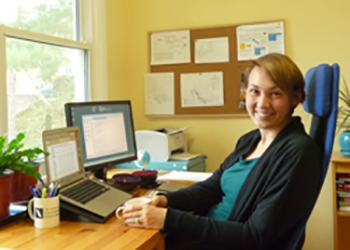
Ruth Lavergne is a PhD student based out of UBC’s Centre for Health Services and Policy Research. Her thesis work examines how and why healthcare use and costs vary from place to place. She’s also involved in research that examines physician practice patterns and the impact of primary care incentive payments on patient care. What all of this work has in common is the use of BC’s rich administrative health data sources, accessed through Population Data BC’s Secure Research Environment (SRE).
The SRE is a secure private cloud accessible only via an encrypted Virtual Private Network through a firewall and two-factor authentication. After her data access request was approved, Ruth’s data extract was placed on the SRE. The SRE provides secure storage and backup, a centralized location for access and processing of research data, a range of software for use in data analysis and security standards that meet Data Steward’s requirements.
While Ruth’s research is based out of UBC, midway through her PhD she moved to Deep River, a town of 4,000 people, two hours northwest of Ottawa. “Thanks to access through the SRE, my research hasn’t been interrupted at all. I can login to any of the projects I work on from my home office. The SRE allows me to collaborate on data preparation and analysis with other researchers in BC. I also work closely with a programmer in rural Manitoba, who, like me, enjoys access from a home office. As I speak, I have models running on an SRE machine at PopData.”
“The remote desktop provides an intuitive platform to work with the data. I use multiple software packages in my analysis and have everything I need on the SRE. I don’t need to worry about privacy or security or buying my own software – and, should hiccups occur, SRE support is easily accessible.”
Ruth is making plans for postdoctoral research in the area of primary care reform. “Canadian provinces have tried various approaches in attempts to strengthen primary care, and there is huge potential to learn from successes and failures by comparing across provinces. However, research capacity remains fragmented by province, and access to data is often a challenge, so cross-provincial research using administrative data is rare. Access through the SRE means that even when based in a new province, I’ll still be able to work with BC data, and develop comparable methods and measures between datasets of both provinces. This allows exciting new cross-provincial research, and shows how PopData is an important resource for researchers, not just is BC, but across Canada.”
Population Data BC runs 45 SRE machines on the Windows Platform, available as-needed to research teams. Twelve utilities and twenty-one software programs are available including: ArcGIS, SAS, SPSS, Stata, M-Plus, MatLab and R. For more details visit: www.popdata.bc.ca/dataaccess/receiptofdata/sre